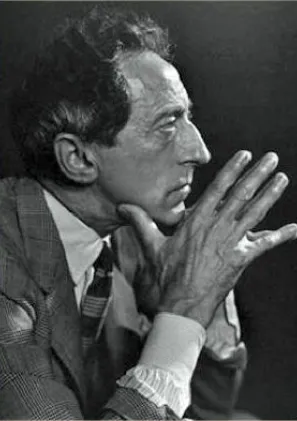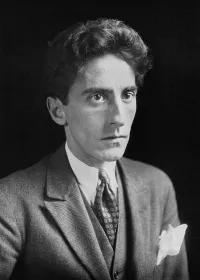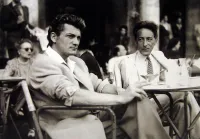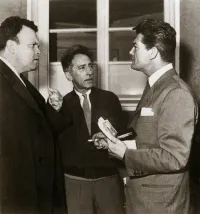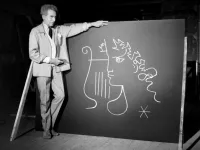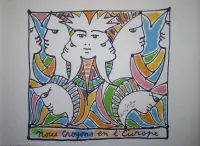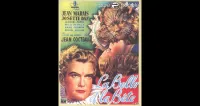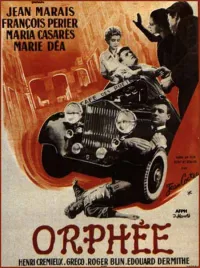Biography
1889 - 1963
"True realism consists in revealing the surprising things which habit keeps covered and prevents us from seeing."
- Jean Cocteau
He was a renowned novelist, playwright, critic, composer, set designer, artist, and painter – but when asked, the internationally acclaimed Jean Cocteau always referred to himself as a poet. Publishing his first volume at 19, he went on to write over 20 books of poetry. In 1923, after the death of his lover, novelist Raymond Radiguet, Cocteau began using opium. His use of the drug and efforts to stop greatly impacted his work. The most famous of his 6 novels, Le Enfants Terribles (1929) was written during a week of withdrawal and Opium (1930) is an account of his addiction. His 20 plays include ‘La Voix Humaine,’ (1929) which featured only a woman on stage talking on the telephone. It was followed by what is considered his greatest play – ‘La Machine Infernale’ (1934) – a reworking of the story of Oedipus. In 1940 Cocteau wrote the enormous stage hit ‘Le Bel Indifferent’ which starred Edith Piaf. During WWII, the Vichy government branded him as decadent due to his drug addiction and homosexuality. After the war he returned to Paris, gaining notoriety as an avant-garde filmmaker with such classics as ‘The Beauty and the Beast’ (1946), and ‘Orpheus’ (1949), both of which starred his lover Jean Marais – the latter also featuring Edouard Dermithe, another actor/lover whom Cocteau formally adopted. His films are considered essential for introducing surrealism to French cinema. His numerous honors include his election to the Academie Francaise and commander of The Legion of Honor. Jean Cocteau died at his chateau in France in 1963; it is said his heart ceased beating upon hearing news of the death of Edith Piaf.
1889 - 1963
"True realism consists in revealing the surprising things which habit keeps covered and prevents us from seeing."
- Jean Cocteau
He was a renowned novelist, playwright, critic, composer, set designer, artist, and painter – but when asked, the internationally acclaimed Jean Cocteau always referred to himself as a poet. Publishing his first volume at 19, he went on to write over 20 books of poetry. In 1923, after the death of his lover, novelist Raymond Radiguet, Cocteau began using opium. His use of the drug and efforts to stop greatly impacted his work. The most famous of his 6 novels, Le Enfants Terribles (1929) was written during a week of withdrawal and Opium (1930) is an account of his addiction. His 20 plays include ‘La Voix Humaine,’ (1929) which featured only a woman on stage talking on the telephone. It was followed by what is considered his greatest play – ‘La Machine Infernale’ (1934) – a reworking of the story of Oedipus. In 1940 Cocteau wrote the enormous stage hit ‘Le Bel Indifferent’ which starred Edith Piaf. During WWII, the Vichy government branded him as decadent due to his drug addiction and homosexuality. After the war he returned to Paris, gaining notoriety as an avant-garde filmmaker with such classics as ‘The Beauty and the Beast’ (1946), and ‘Orpheus’ (1949), both of which starred his lover Jean Marais – the latter also featuring Edouard Dermithe, another actor/lover whom Cocteau formally adopted. His films are considered essential for introducing surrealism to French cinema. His numerous honors include his election to the Academie Francaise and commander of The Legion of Honor. Jean Cocteau died at his chateau in France in 1963; it is said his heart ceased beating upon hearing news of the death of Edith Piaf.
Demography
Demography
Gender Male
Sexual Orientation Gay
Gender Identity Cisgender
Ethnicity Caucasian/White
Nations Affiliated France
Era/Epoch Art Deco (1910-1940) Great Depression (1929-1939) Roaring Twenties (1920-1929) World War I (1914-1918) World War II (1939-1945)
Field(s) of Contribution
Art
Author
Film
Military
Music
Poet
Theater
Commemorations & Honors
Commander of the Legion of Honor
Member of the French Mallarmé Academy, German Academy, American Academy and Mark Twain Academy
Cannes Film Festival and the France-Hungary Association Honorary President's
President of the Jazz Academy and of the Academy of the Disc
Académie Française Member (1955)
The Royal Academy of Belgium Member (1955)
Demography
Gender Male
Sexual Orientation Gay
Gender Identity Cisgender
Ethnicity Caucasian/White
Nations Affiliated France
Era/Epoch Art Deco (1910-1940) Great Depression (1929-1939) Roaring Twenties (1920-1929) World War I (1914-1918) World War II (1939-1945)
Field(s) of Contribution
Art
Author
Film
Military
Music
Poet
Theater
Commemorations & Honors
Commander of the Legion of Honor
Member of the French Mallarmé Academy, German Academy, American Academy and Mark Twain Academy
Cannes Film Festival and the France-Hungary Association Honorary President's
President of the Jazz Academy and of the Academy of the Disc
Académie Française Member (1955)
The Royal Academy of Belgium Member (1955)
Resources
Resources
Brown, Frederick. An Impersonation of Angels: A Biography of Jean Cocteau. New York: Viking, 1968.
Crowson, Lydia. The Esthetic of Jean Cocteau. Hanover, N.H.: University Press of New England, 1978.
Emboden, William A. The Visual Art of Jean Cocteau. New York: H.N. Abrams, 1989.
Evans, Arthur B. Jean Cocteau and His Films of Orphic Identity. Philadelphia: Art Alliance, 1977.
Fifield, William. Jean Cocteau. Columbia Essays on Modern Writers 70. New York: Columbia University Press, 1974.
Fowlie, Wallace. Jean Cocteau: The History of a Poet's Age. Bloomington: Indiana University Press, 1966.
Gilson, René. Jean Cocteau, An Investigation into his Films and Philosophy. Trans. Ciba Vaugh. New York: Crown, l969.
Knapp, Betinna L. Jean Cocteau. Twayne's World Authors Series. Rev. Edition. New York: Twayne Publishers, 1989.
Peters, Arthur King. Jean Cocteau and His World: An Illustrated Biography. Foreword by Ned Rorem. New York: Vendome Press, 1986.
Saul, Julie, ed. Jean Cocteau: The Mirror and the Mask: A Photo-biography. Boston: Godine, 1992.
Steegmuller, Francis. Cocteau, A Biography. Boston: Little Brown, 1970.
https://en.wikipedia.org/wiki/Jean_Cocteau
http://www.homohistory.com/2012/09/jean-cocteau-and-jean-marais-first.html
http://rictornorton.co.uk/cocteau2.htm
https://medium.com/@brianhmatthews/unraveling-fantasy-the-homoerotic-ne…
Resources
Brown, Frederick. An Impersonation of Angels: A Biography of Jean Cocteau. New York: Viking, 1968.
Crowson, Lydia. The Esthetic of Jean Cocteau. Hanover, N.H.: University Press of New England, 1978.
Emboden, William A. The Visual Art of Jean Cocteau. New York: H.N. Abrams, 1989.
Evans, Arthur B. Jean Cocteau and His Films of Orphic Identity. Philadelphia: Art Alliance, 1977.
Fifield, William. Jean Cocteau. Columbia Essays on Modern Writers 70. New York: Columbia University Press, 1974.
Fowlie, Wallace. Jean Cocteau: The History of a Poet's Age. Bloomington: Indiana University Press, 1966.
Gilson, René. Jean Cocteau, An Investigation into his Films and Philosophy. Trans. Ciba Vaugh. New York: Crown, l969.
Knapp, Betinna L. Jean Cocteau. Twayne's World Authors Series. Rev. Edition. New York: Twayne Publishers, 1989.
Peters, Arthur King. Jean Cocteau and His World: An Illustrated Biography. Foreword by Ned Rorem. New York: Vendome Press, 1986.
Saul, Julie, ed. Jean Cocteau: The Mirror and the Mask: A Photo-biography. Boston: Godine, 1992.
Steegmuller, Francis. Cocteau, A Biography. Boston: Little Brown, 1970.
https://en.wikipedia.org/wiki/Jean_Cocteau
http://www.homohistory.com/2012/09/jean-cocteau-and-jean-marais-first.html
http://rictornorton.co.uk/cocteau2.htm
https://medium.com/@brianhmatthews/unraveling-fantasy-the-homoerotic-ne…
